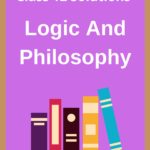Class 12 Logic And Philosophy Chapter – 8 Religion The answer to each chapter is provided in the list so that you can easily browse throughout different chapter Assam Board Class 12 Logic And Philosophy Chapter – 8 Religion and select needs one.
Class 12 Logic And Philosophy Chapter – 8 Religion
Also, you can read SCERT book online in these sections Solutions by Expert Teachers as per SCERT (CBSE) Book guidelines. These solutions are part of SCERT All Subject Solutions. Here we have given Assam Board Class 12 Logic And Philosophy Chapter – 8 Religion Solutions for All Subject, You can practice these here…
Religion
Unit-8
A) Very short type answers :- 1 marks each.
1) The word ‘Religion’ is derived from which Latin word ?
Ans:- The word religion is derived from the Latin word ‘religare’.
2) What is the meaning of the Latin word ‘Religare’ ?
Ans:- The word religare means ‘bond’.
3) From which Sanskrit root the word ‘Dharma’ is derived ?
Ans:- The word ‘Dharma’ is derived from the Sanskrit root word ‘dhri’, which means ‘to sustain’.
4) According to whom ‘Religion is the knowledge possessed by the finite mind of its nature as absolute mind’ ?
Ans:- Hegel gave the above definition of religion.
5) Who say, “moral obligation and responsibility lead to the idea of God’ ?
Ans:- Martineau says the above lines.
6) Do you believe that it is religion that makes morality ?
Ans:- No, religion and morality are independent of each other.
7) Do you believe that religion is an end in itself ?
Ans:- No, religion reacts upon morality and inspires and elevates it.
8) “Religion is the knowledge possessed by the finite mind of its nature as absolute mind” – Name the philosopher associated with the statement.
Ans:- Hegel.
9) “The minimum definition of religion is :- A belief in spiritual beings” – write the name of the philosopher associated with the statement.
Ans:- E. B. Tylor.
10) “Religion is a mental faculty or disposition which enables may to apprehend the infinite” – Name the philosopher associated with the statement.
Ans:- Max Muller.
11) “Religion is a warm intimate, immediated awareness of the infinite in the finite, the Eternal in the temperal, a sense of dependence on the whole” – write the name of the philosopher associated with the statement.
Ans:- Schiermacher.
12) “Religion is morality touched with emotion” – write the name of the philosopher associated with the statement.
Ans:- Mathew Arnold.
13) “Religion is the belief in the ever living God, that is, in a divine Mind and Will ruling the universe and holding moral relations with mankind” – who associated with this statement.
Ans:- Martineau.
14) “Religion is a faith in the conservation of values” – Name the philosopher who associated with the statement.
Ans:- Hoffding.
15) ‘Morality is the source of religion’ – who support this ?
Ans:- Kant, Martineau etc.
B) Short type answers :- 2 marks each.
1) What is the etymological meaning of Religion ?
Ans:- Etymologically, religion means a bond which unites the human life as well as the social life.
2) What are the three elements involved in Religion ?
Ans:- The three elements involved in religion are thinking, feeling and willing.
3) What is religion according to Mathew Arnold ?
Ans:- According to Mathew Arnold “Religion is morality touched with emotion”.
4) Mention two important characteristics of Religion.
Ans:- The characteristics of religion are as follows :-
i) The motives and the driving forces in religion are the basic human wants and desires – survival, growth, well being, self – relization.
ii) Religion involves belief in a supreme power or powers on whom human beings depend for their well – being.
iii) Religion involves rituals which are believed to be way of winning the favour of God or gods.
iv) Like all major human activities, religion assumes a social institutions from.
5) What are the points of similarity between Religion and Morality ?
Ans:- Religion implies mans belief in God or gods and his attempts to commune with Him.
6) Mention two important points of difference between Religion and Morality.
Ans:- there are some points of differences between religion and morality as follows :-
i) Religion has its centre in God while morality has its centre in man.
ii) It is conceivable that there may be a purely humanistic morality which contains no reference to the supernatural but religion would lose its essential nature if all reference to the supernatural is excluded from it.
7) Do you believe that Religion is an end in itself ? Give reasons for your answer.
Ans:- No. Religion is not an end in itself. Morality is necessary to religion. Morality refines and purifies religion. So, religion finds its expression in morality. Again, morality culminates in religion. The great prophets of all religions have emphasised on the ethical qualities of righteousness and love as attributes of God and of the truly religious life.
See More…

Hi, I’m Dev Kirtonia, Founder & CEO of Dev Library. A website that provides all SCERT, NCERT 3 to 12, and BA, B.com, B.Sc, and Computer Science with Post Graduate Notes & Suggestions, Novel, eBooks, Biography, Quotes, Study Materials, and more.



